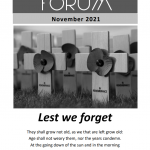webdev
Thought for the Week – 14th November 2021
Remembrance
A prayer for remembrance, for Sunday and for any time:
God of all nations, active throughout history and in our own world, we remember those who serve or have served in our armed services. We hold before you all who have been killed in action, or by disease, the bereaved, the lost, the families which have been shattered, the wounded, maimed and injured, those who held or still hold in silence unspeakable memories of warfare.
As we remember those who fought in the past, those who serve at present and those who remained or now remain anxiously at home, let us pray that God will heal all memories, speak a word of peace, and bring us his healing. Amen
Rev David Poyner
Thought for the Week – 7th November 2021
Blah, Blah, Blah
The teenage climate activist, Greta Thunberg, spoke before the current climate meeting about her fears, most notably that all we would hear would be “blah, blah, blah”; the sound of talking to mask the lack of any action. As a person who hates meetings, I have some sympathy with this view. One of the great advantages of the current fashion for meetings held by computer is that I can join, then switch my camera and microphone off and do something more productive, or at least more enjoyable, with my time. However, I am also aware that it is only by hearing others speak that I can begin to understand their views, to hear their arguments and perhaps see my own position in a new light. On a PCC, the most valuable comment is often “Yes vicar, but have you thought about….”. The Bible has accounts of what seem to be have been very lively meetings. Perhaps some of the best are where God seems to be having an argument with someone praying to him; not always getting the better of the exchange and so changing his mind. Words can be blah, blah blah if one, or all parties to a conversation do not listen to what is being said, but they also have immense power to transform if they are properly heard. That is the pattern we see in the Bible and perhaps is what we have also witnessed in Glasgow this week.
Rev David Poyner
November 2021 Forum
Thought for the Week – 31st October 2021
Habakkuk and COP26
No, until this afternoon, I don’t think I had read Habakkuk either; in fact if you had asked me if there was a book bearing his name in the Bible, I might have struggled to give an honest answer. He is what is known as a “minor prophet” and the name says it all. It is a short book, buried in the middle of the Old Testament surrounded by other books that rarely get read.
The book was written in response to a great catastrophe that was about, or had just, befallen the Jewish nation; probably the destruction of Jerusalem. But Habakkuk did not just see this as the fall of a city or even a nation; he saw it as the destruction of all of creation, the end of the natural world;
“Though the fig tree does not bud and there are no grapes on the vines, though the olive crop fails and the fields produce no food, though there are no sheep in the pen and no cattle in the stalls”
In spite of this, he had hope:
“yet I will rejoice in the Lord, I will be joyful in God my Saviour. The Sovereign Lord is my strength; he makes my feet like the feet of a deer, he enables me to tread on the heights.”
Habakkuk had faith, that God would provide the resources for his people to rise again.
Today, his fears sound particularly appropriate for the climate crisis we are facing, where trees do not bud, crops fail and livestock dies. But just as in the days of Habakkuk, God does not abandon us. As in those days, he gives us resources, human ingenuity to devise solutions. But just as in the days of Habakkuk, this relies on us taking advantage of those resources.
Rev David Poyner
Thought for the Week – 24th October 2021
Valuing Others
The news last weekend was dominated by the murder of Sir David Amess, the MP killed during a routine meeting with constituents. This brought back memories of a few years ago, the killing of Jo Cox, another MP. Both lost their lives by simply doing their job, as elected representatives of us all.
Politics thrives on debate and argument. MPs can expect to be criticised for the views they hold; on occasions it may be appropriate to offer personal criticism, if for example, they say one thing and do another. But, from what I can see, this is uncommon; most MPs have integrity. What we (and they) should not do is to use language that degrades their humanity; I worry when I hear words such as “scum” or glib judgements that “they are all the same”. They are not; each is a human; in Christian terms, a unique person in the image of God.
From a book I have recently read, I understand that in Zulu, “sawubona” is a greeting; its meaning covers seeing and recognising a fellow human. The response “shiboka” can be translated “I exist for you”. The authors of the book make the point that when a Benedictine monk meets another person, the monk bows to face the ground; this is an acknowledgement both that God is within that person and that they and the person they have met share the same earth. These truths apply to all we meet, whatever we may think of them.
Rev David Poyner

